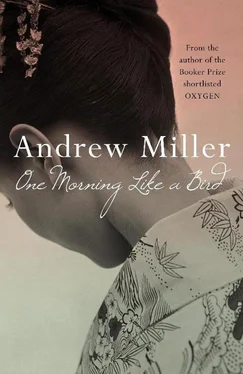The wedding photographer nods vigorously. Yuji has heard nothing of this. A block captain? He scans his neighbours’ faces, seeing, on at least three of them, the nervous smirks of schoolboy conspirators.
‘When you think about,’ says Otaki, ‘it should be someone with experience.’
‘I agree,’ says Itaki. ‘But someone with the right experience.’ He looks at Saburo and grins.
‘And a cool head,’ says the photographer. ‘Wouldn’t that be important?’
‘Certainly,’ says Otaki, now, like the other two, casting shy glances at the lounging figure at the top of the table.
‘Professor Takano,’ drawls Saburo, watching the smoke of his cigarette flowing in slow blue waves from between his outstretched fingers, ‘is the most educated man here . .’
Father looks up. ‘Quite impossible,’ he says, addressing Otaki in a voice that invites no further discussion.
‘Is it a position for a younger man?’ asks Otaki, flustered.
‘Perhaps you are right,’ says Saburo. ‘In which case, the professor’s son would be a good candidate. Isn’t it true,’ he says, smiling at Yuji, ‘that you’re a few months younger than me?’
‘It’s true,’ says Yuji. ‘But I wonder if my experience is really suitable.’
‘The difficulty,’ answers Saburo, ‘is knowing what your experience really is.’
The photographer giggles.
‘His experience,’ says Father, ‘is more varied than you might imagine. How many of us here, for example, can speak another language, fluently, as Yuji does?’
‘Is it Chinese?’ asks Saburo, jutting his head forwards. ‘Chinese is the language he’ll need soon.’
Mr Kawabata returns from the toilet. ‘Hardly a drop,’ he mutters, knee joints cracking as he takes his place on the mat. ‘And yet I felt I needed it.’
‘But what about you ?’ asks Itaki, bowing and addressing Saburo as ‘honourable soldier’.
‘Wouldn’t you consider it?’ adds Otaki.
‘We would really feel we had the right person,’ says the photographer.
‘Aren’t you forgetting something?’ asks Saburo, one finger tapping the Wound Medal.
‘But you move around like a cat,’ says Itaki.
‘Really, it’s remarkable,’ says Kiyama.
‘The truth,’ says Saburo, ‘is that my vote was going to be for Mr Ozono. He has made the greatest sacrifice. Shouldn’t we show our appreciation of it by offering the position to him?’
Ozono blushes. ‘Like the professor,’ he says, ‘it would be quite awkward, at this moment, to accept such a responsibility. If I still had Kenji to help in the shop, but . .’
‘You’re the perfect choice,’ says Itaki to Saburo. ‘Don’t you see?’
‘I don’t know,’ says Saburo. ‘There may be some people here who think I’m not up to it.’
‘Eh? Everybody has the greatest confidence in you,’ says Otaki, glancing eagerly around the table.
‘Everybody?’
‘Please,’ says Itaki. ‘You must let us insist.’
‘It’s embarrassing . .’ says Saburo. He waits. Is he counting off the seconds? Then he sighs as though some great burden is being lowered onto his shoulders. ‘But if you are going to insist, what can I say except I will try to serve you and His Sacred Majesty with all my strength. Just as I did in China.’
‘So you’ll do it?’ asks Otaki.
‘Abolish victory until the final desire!’ cries Mr Kawabata, his eyes tightly shut, his cheeks trembling with emotion.
Yuji looks over to the door. The old woman has leaned into the light so that it hangs in a yellow veil across her face. Seeing herself observed, she settles back on her haunches, steals her smile back into the shadows.
By eight thirty, swept along by a wave of satisfaction that the matter of the appointment (this irksome new post no honest tradesman could be expected to waste his time on) has been handled with the necessary deftness, all other business — saving deposits, sanitation, liaison with community councils, comfort bags for the troops — is dealt with easily. Otaki summons his wife. She comes in with a steaming earthenware pot of fat white udon noodles. The sister brings in the sake. They drink to the anniversary of the Empire, to the health of the imperial family, to the army, to the navy, to the homeland. They tilt back their heads and sing the neighbourhood association song (‘A sharp tap, tap from the neighbourhood asso-ci-ation! When I opened the lattice gate, there was a fa-mi-liar face!’) The photographer begins a story about a young couple he photographed the previous week in Shitaya, but no one, it seems, can understand whether the story is intended to be sentimental or lewd.
Father begins to push himself up from the mat. ‘If you will excuse me . .’
‘Before we finish,’ says Saburo, ‘let me thank you again for your confidence in me.’
‘Not at all,’ says Otaki. ‘It’s we who must be grateful.’
‘I am a soldier,’ says Saburo. ‘I think like a soldier.’
‘That’s exactly it,’ says Itaki.
‘Soldiers don’t put off what needs to be done,’ continues Saburo. ‘They do it straight away.’
‘Like photographers!’ cries the photographer, his face blazing from the drink.
‘So I have made a rota . .’
‘A rota?’ asks Otaki, quietly.
‘For fire-watching,’ says Saburo. ‘Other rotas will follow. I will post them on the gate of my house. Everyone will make it his duty to read them at least once a day. There can be no excuses.’ He pauses to put on his cap, to carefully adjust it. ‘The honour of taking the first watch I have awarded to the Takano family. It is now nine twenty. Deployment will commence at nine forty-five.’ He uses the wall to gain his footing, takes the crutch and leaves with the old woman. The door slides shut. The chimes jangle. The men keep their eyes lowered. Otaki bares his teeth at the table, makes a kind of sucking noise. After a few moments his sister, very discreetly, begins collecting the dishes.
At nine fifty Yuji is in his greatcoat on the drying platform, a woollen muffler wrapped over his skull and knotted beneath his chin. On his right sleeve he wears the armband Saburo gave him at nine forty-five, a white band on which Kyoko or the old woman has embroidered the character for fire. He has also been issued with a wooden rattle and a whistle on a length of string. At ten o’clock Miyo brings him tea, then he is alone again. Father will relieve him at two o’clock but two o’clock is a long way off. He sniffs, dabs at his nose, punches some warmth into his arms. One by one, with a soft metallic sound, the big orange leaves of the gingko tree are falling. He starts to pace, then stops and creeps to the platform parapet. Something is moving down there. One of the cats? He leans over, squints. A torch beam bursts against his face.
‘Don’t let me catch you sleeping,’ hisses Saburo, a voice without a body. ‘Don’t ever let me catch you sleeping!’
The light clicks off. For half a minute Yuji is blind, then the night patiently reassembles itself. The tree, the far-off flickering of ‘Jintan Pills’, the undulating roofs, the decorative rake of searchlights above the palace. And finally, untellable at first from the fragments of beam at the backs of his eyes, the stars in their vast garrisons, glistening in the brittle air.
In the heart of the Low City, a man is lying under the front of a blue van. Only his legs are visible, two stout legs and a pair of feet in split-toed canvas boots. A small crowd has gathered, the sort who will stop to watch two birds fighting over a worm. Yuji, raw-eyed after three shifts on the platform in the eight nights since the meeting at Otaki’s, is kneeling at the side of the boots trying to decide whether he should mention the policeman who, at a policeman’s leisurely pace, is making his way past the line of traffic behind the van. What do they have in the back today? Radio valves, two or three sacks of charcoal, some light bulbs, a case or two of Korean brandy . . How interested would a policeman be in such things?
Читать дальше












